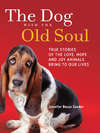Loe raamatut: «The Dog with the Old Soul»
Midagi läks valesti, proovige hiljem uuesti
€1,64
Žanrid ja sildid
Vanusepiirang:
0+Ilmumiskuupäev Litres'is:
13 mai 2019Objętość:
177 lk 30 illustratsiooniISBN:
9781472010759Õiguste omanik:
HarperCollins










